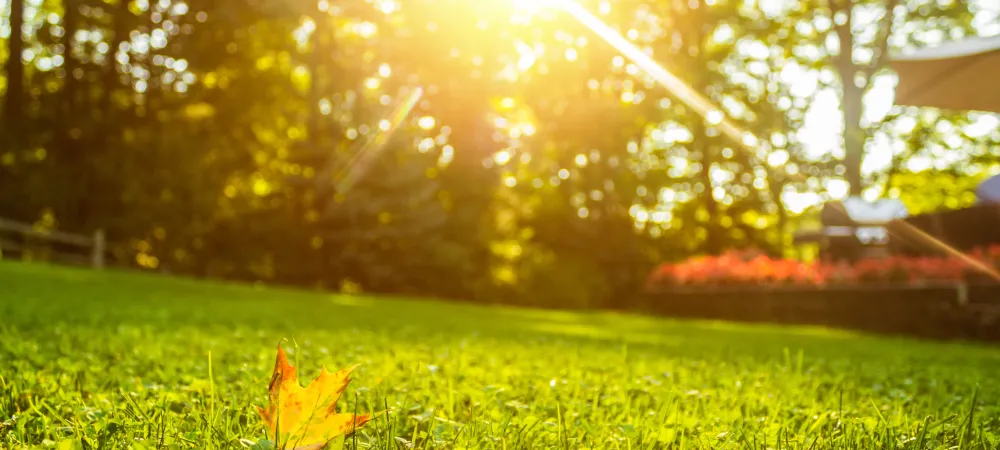Common Types of Grass Seeds

While it may not seem like it, spring is just around the corner. Soon you’ll be able to ditch that insulated jacket and sweater and get back outside to tend to your lawn and landscape. In the meantime, why not make a list of items you need to do this spring and start thinking ahead. Perhaps one of those items includes laying down new grass seed. Maybe you just bought a new property or are ready to renovate your lawn. Either way, a ton goes into deciding what type of grass seed to use.
Types of Grasses In Arlington, Virginia
In Arlington, Virginia, we mainly have cool-season grasses, including Kentucky bluegrass, rough bluegrass, ryegrass, fine fescue, and turf-type fescue. In the Southern part of the state, sometimes the warm-season grass, zoysiagrass, is also used. For your particular Arlington home or business, you will want to consider the following factors:
- How much shade does your yard get
- How much rain do you experience
- How much work do you want to put into your lawn
- The amount of traffic over your grass
- What specific look you’re going for with your yard
To help you determine which type of grass seed is best for your property, we have taken the liberty of breaking down the most common types of Virginia grasses, the benefits and disadvantages of each, and what environment each one grows best in.
Cool-Season vs. Warm Season Grasses
First, there are two types of grass seeds, cool-season, and warm-season. Like the ones that grow here in Arlington, cool-season grasses grow best in northern climates with moderate summer and cooler winters. The main difference depends on when each of these two categories of grasses goes dormant. Cool-season grasses do not go dormant until temperatures fall consistently below 45 degrees, while warm-season grasses go dormant after temperatures drop below 65 consistently. Other than zoysia, warm-season grasses include St. Augustine, Bermudagrass, and centipede.
Common Types of Cool-Season Grasses in Arlington
There are many different types of grass in Virginia to keep in mind. These can include:
Kentucky Bluegrass
Kentucky bluegrass is one of the most attractive grass species used on many home lawns and parks, athletic fields, and campuses around Virginia. It has dark-green leaves with a medium to fine texture. It produces underground stems called rhizomes that encourage turf density and are able to aid in recovery after damage, setting Kentucky bluegrass apart from other cool-season grasses. It prefers partial sun to mostly shade, is cold-tolerant, tolerant to heavy foot traffic, and moderately tolerant of heat and drought. It handles droughts better during the cool season and needs diligent watering in the summer. If you are looking for an attractive turf and spend a lot of time outside entertaining, this may be the perfect choice for you.
Tall fescue
Tall fescue is a popular turf seed here in Virginia due to its cold, heat, and drought tolerance. It is commonly used in low-maintenance situations such as utility areas, fairgrounds, and airstrips. It occasionally produces rhizomes but establishes root systems and has only a fair recovery potential. It does well in both sun and shade and grows best in well-drained soil. Tall fescue is the most heat and drought tolerant of all the cool-season grasses. It is less susceptible to pests than Kentucky bluegrass and acts as a natural weed controller by blocking out the sunlight the weeds need to grow. It does grow rather fast, so it may require more upkeep and mowing. It also tends to grow in clumps which may not be the best grass seed to mix with other cool-season turfs.
Fine Fescue
This grass variety has thin leaves, is highly adaptable to all sorts of conditions, and doesn’t need a lot of attention. It encompasses at least five major species, including:
- Fine fescue
- Sheep fescue
- Chewings fescue
- Creeping red fescue
- Slender creeping red fescue
The five varieties are often sold as a blended-seed mix because they tolerate drought and shade well, but they do not do well in hot, humid conditions or poorly drained soil. As the name states, fine fescues are just that, very fine. The leaves are medium green to blue-green. They are not well adapted to hot, humid conditions; poorly drained soils; high-traffic areas such as athletic fields or playgrounds; and high nitrogen fertilizer rates. Like Kentucky bluegrass, the fine fescues become semi-dormant under prolonged periods of heat and drought and recover quickly with the advent of cooler temperatures and adequate soil moisture.
Perennial ryegrass
Ryegrass is a hardy, dark-green, fine to medium textured grass used for homes, parks, golf courses, and athletic fields throughout the Arlington area. It is commonly mixed with Kentucky bluegrass which takes longer to grow, acting as a cover protecting the Kentucky bluegrass from the sun until it is established. It is a hardy, low-maintenance grass that is insect and disease resistant. Unfortunately, it grows in clumps and can often appear patchy and bare spots regularly need to be re-seeded. It is also susceptible to ice damage if the temperatures drop too low in the winter. Annual ryegrass is an excellent way to quickly repair and restore thinning lawns acting as a “nurse crop for its ability to grow and protect other grasses rapidly.
For All Your Overseeding and Lawn Renovation Needs, Contact Nuleaf
When it comes time to seed your new or existing lawn, don’t try and figure things out on your own. Picking out the right grass seed for your property can be challenging and time-consuming. Get help from professionals. Nuleaf offers both overseeding and lawn renovation services for Arlington, Annandale, Fairfax, Springfield, and Alexandria areas. Nuleaf’s lawn renovation program and overseeding services will restore, repair, and add life to your lawn. Visit our website to learn more or contact us online or by phone now. Our number is 703-688-8967.
Did you find the article above informative? If so, feel free to share with family and friends. Then stay tuned and save this link to check out next month’s blog here.

